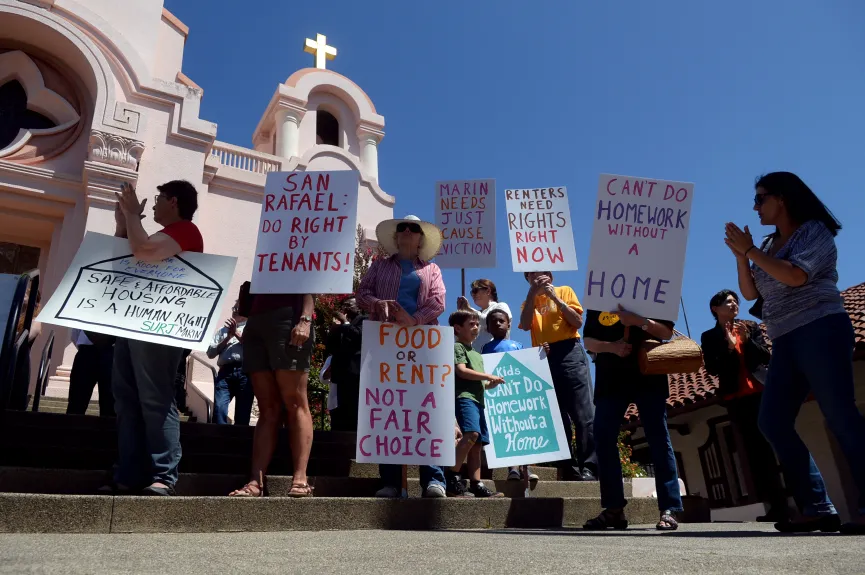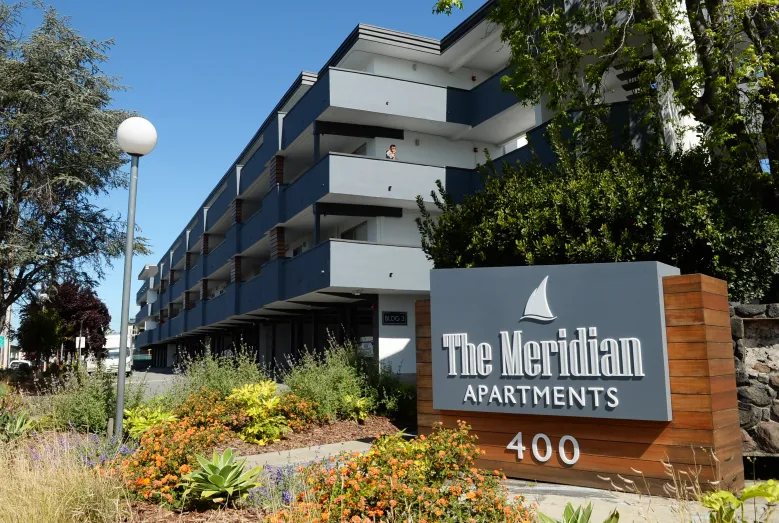
Supporters of tenants’ rights hold signs during a rally in front of Saint Raphael Church in San Rafael on Aug. 17, 2018. Marin Organizing Committee and Legal Aid organized the event to protest 40 percent rent increases for apartment buildings in the Canal neighborhood. On Monday, the city approved temporary protections for renters in parts of the Canal neighborhood following a recent wave of evictions. (Alan Dep/Marin Independent Journal)
San Rafael has approved temporary protections for renters in parts of the Canal neighborhood following a recent wave of evictions.
The law amends the city’s cause for eviction code and relocation assistance program for the designated “opportunity zone,” which covers two census tracts in the Canal where residents have been disproportionately displaced.
Opportunity zones are economically distressed communities where new investments, under certain conditions, might be eligible for preferential tax treatment under the 2017 Tax Cuts and Jobs Act. The city adopted a relocation assistance program for the neighborhood in 2021 to discourage gentrification.
 The Meridian Apartments, at 400 Canal St. in San Rafael, Calif. on Tuesday, April 16, 2024. (Alan Dep/Marin Independent Journal)
The Meridian Apartments, at 400 Canal St. in San Rafael, Calif. on Tuesday, April 16, 2024. (Alan Dep/Marin Independent Journal)
Under the new urgency ordinance, landlords will no longer be able to evict tenants for health and safety renovations in most cases. If a home must be vacated, landlords must provide the tenant with temporary relocation assistance and the right to return to their dwelling after work is complete.
Since October 2022, 31 tenant households were evicted on grounds of “substantial rehabilitation for health and safety within the Canal opportunity zone,” Alexis Captanian, the city’s housing manager said.
The urgency ordinance, which took effect immediately following a unanimous City Council vote Monday, is designed as a stop gap to prevent more displacement while city officials examine citywide tenant protections, Captanian said.
“Due to the tight rental market in San Rafael and Marin County, it is extremely difficult for displaced tenants to secure housing,” Captanian said. “Staff has received reports of displaced opportunity zone tenants moving out of Marin, doubling up with other families, or becoming unhoused and moving into their cars.”
Captanian said the urgency ordinance will expire at the end of 2026, which is in line with the end of the opportunity zone tax benefits. Officials expect to bring forward proposals for citywide tenant protections before the urgency ordinance expires, she said.
At the center of the issue is a 99-apartment complex at 400 Canal St. where dozens of tenants have been displaced for renovations. Tesseract Capital Group, a San Francisco private equity firm, began a multimillion dollar renovation of the complex two years ago, and have since asked several tenants to voluntarily relocate and evicted others.
Representatives of the company did not respond to requests for comment.
The issue of skyrocketing rent in the densely populated neighborhood has been ongoing for years. Last year, renters and their supporters formed a coalition begging San Rafael city officials to enact rent control, or provide some sort of protection to keep families from being forced out of their homes.
While the city has recorded 31 “no-fault evictions,” coalition members say the number is actually much higher because many tenants didn’t know their rights and left out of fear.
“Too bad this ordinance wasn’t approved before, because it could have helped a lot of people who were displaced … who didn’t know where to go,” said Cruz Vargas, a volunteer with the Voces Del Canal advocacy group.
Vargas, who addressed the council in Spanish on Monday, said she hopes the city will develop a permanent ordinance to protect families beyond the two years.
Captanian said there are approximately 1,800 dwellings in the opportunity zone of the Canal neighborhood, and about 1,500 of those are apartments, making it one of the most concentrated areas of rental housing.
The neighborhood has higher rates of severe housing cost burden, meaning rent is equal to more than 50% of the household income. There is also more overcrowding in the Canal than in other areas of the city, Captanian said.
In cases where a substantial remodel is needed for health and safety, the landlord will be required to provide daily temporary relocation payments to the tenant or offer a comparable dwelling on the property if one is available.
Relocation payments would be $250 a day during the first 29 days of displacement, which is an average based on the cost of a hotel room or short-term rental, staff said. Starting on day 30, the rate would be based on the tenant’s monthly lease or fair market rate, whichever is greater.
The ordinance will require staff to review the plans during the construction permit process and is subject to administrative fees.
Tenants who choose not to move into temporary digs will be eligible for the city’s existing permanent relocation assistance payments, which is equal to three months of rent, plus estimated moving expenses. If the tenant household includes a person under the age of 18 or over 62, or a person with a disability, the household is eligible for an additional month’s rent.
The amount is calculated based on the tenant’s current rate or fair market rate, whichever is higher.
Lucie Hollingsworth, senior policy attorney with the nonprofit firm Legal Aid of Marin, said while she supports the ordinance, there needs to be strong language for enforcement.
“As currently written a tenant only has a private right of action for wrongful eviction,” Hollingsworth said. “In reality, a tenant can only enforce their rights under this ordinance after they have already been displaced and that is if they have the time and the courage to do that. To truly work towards creating a more equitable city, San Rafael must add that noncompliance with this order is an affirmative defense to an unlawful detainer.”
Hollingsworth said San Rafael has approximately 20% of the county population but in 2023, more than 42% of housing cases for the firm were residents of San Rafael.
Omar Carrera, chief executive officer of Canal Alliance, told the council he is ready to work with city officials on programs for tenant protections, and housing production and preservation.
“Because that’s what we need to solve the housing crisis,” Carrera said. He said that includes creating a tenant registry so officials can have the data they need to make the right decisions.
“I know that it has not been easy. I know a lot of people expect more, but we also understand that there is a process together and that’s what I really encourage all of you to support,” he said.
Used with permission by the Marin Independent Journal.
Read article at the Marin IJ and subscribe to the Marin IJ.
